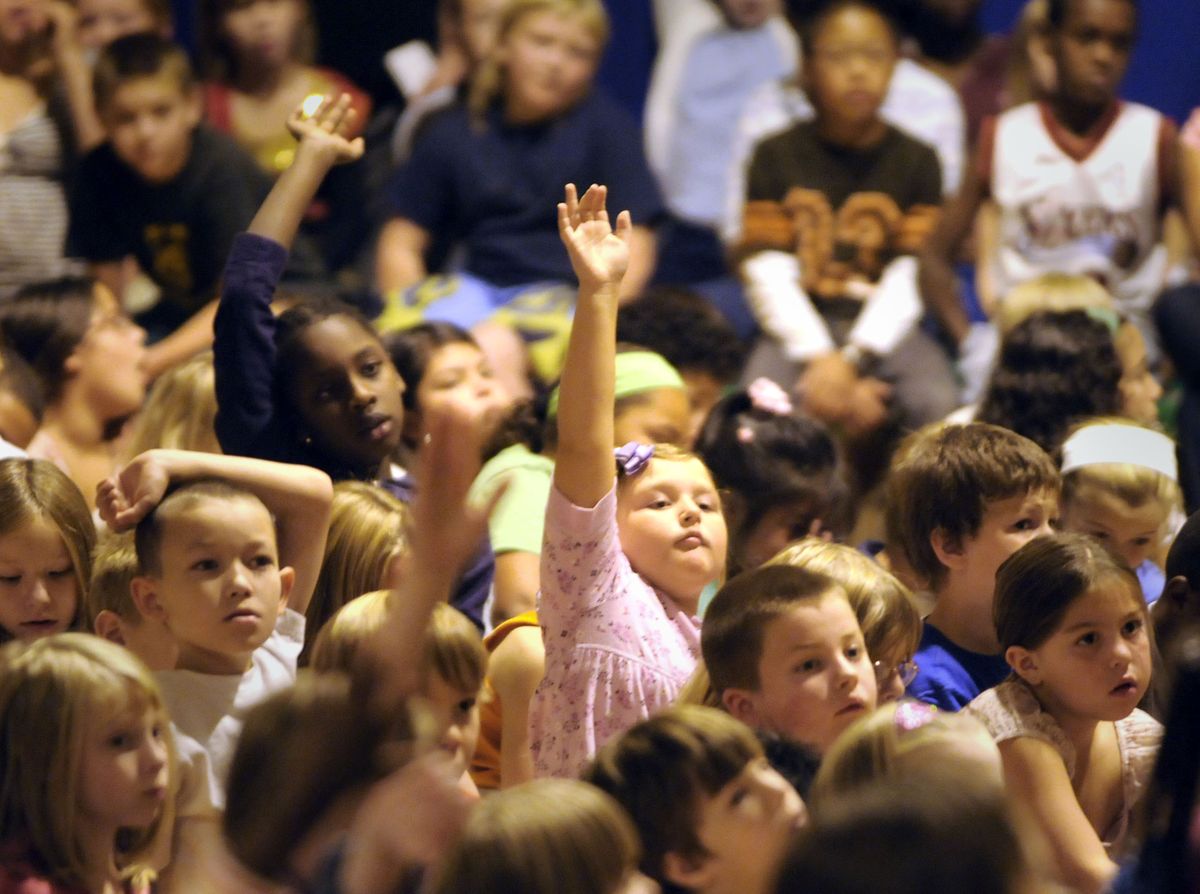Space travelers stir imagination
Curious students at three schools have blast with astronaut, cosmonaut

Living in space is a lot like living at home, retired NASA astronaut Kenneth Reightler Jr. told a group of Spokane students Wednesday.
“You have to get up, wash your face, shave … but you all don’t shave yet, right?” he asked the more than 300 kids seated cross-legged at Grant Elementary School.
“Noooooo,” they responded in unison.
“The difference is, in space, when you play with your food your mom and dad don’t yell at you,” he said.
Reightler and Russian cosmonaut Yury Usachev visited three Spokane schools Wednesday as part of “Community Day” of the Association of Space Explorers 21st Planetary Congress, which is meeting in Seattle this week.
Usachev, 50, dressed in his royal-blue space suit and showed a video presentation of his first trip to space. He’s logged more than 670 days in space and participated in six spacewalks.
At Grant, a scene of Usachev in blue boxers, bouncing in the spaceship, popped up on a screen.
“Ewwww,” the kids roared.
A shot of the crew eating indiscernible paste elicited more ewws and yucks.
“It’s very tasty, believe me,” Usachev said.
Grant Elementary, Sacajawea Middle School and Rogers High School were chosen out of a hat as the three schools the astronauts would visit during their daylong trip.
“We were thrilled,” said Grant’s principal, Julie Perron. “We try hard to seek out opportunities our kids wouldn’t normally have – global, futuristic, follow-your-dreams themes that can be inspiring.”
Reightler, 57, said the goal of the visit wasn’t only to share his experiences, but also to encourage the kids to dream big and set goals.
“I’m a product of public education,” he said. “We show them that (astronauts) come from ordinary families and humble beginnings.”
The astronauts spoke to science classes at Rogers and to all 765 students at Sacajawea and 359 at Grant.
Hundreds of hands flew into the air, flailing when Reightler started the Q-and-A portion at Grant.
Many wanted to know about the extraterrestrial. Had they seen aliens? Had they seen UFOs? Are they on the moon?
“I’m sure we’re not alone in space,” Usachev said.
Others had their own queries.
“Have you ever seen a balloon from space or the remains of a balloon?” one girl asked.
Bev Hopoi, the science coach at Spokane public schools, was amazed by the youngsters’ focus and their deep curiosity.
“Usually the first thing they think about is, ‘How do you go to the bathroom?’ But these kids were thinking big, like ‘How do you get there?’ ” she said.
At the high school, the bathroom question was the second asked.
Reightler said younger kids usually focus on the connection between their lives and life in space while older kids tie in scientific principles or consider the culture and language differences among astronauts.
“Kids have a lot of questions that don’t get answered easily,” he said. “There’s nothing like asking the person who’s really been there. Google can’t do that.”
Hopoi said it’s important to talk about space with elementary-age kids.
“The projected Mars landing is 2030,” she said. “These kids will be the age to go. It’s neat to think about where your kids are gonna go.”
For Reightler, his childhood dream of being an astronaut was far-fetched, he said, because there hadn’t been one yet. Space goals are more attainable now.
“Someday maybe somebody in this room will be one of the first people to step on the surface of Mars,” Reightler said. “It’s not too soon to start dreaming.”